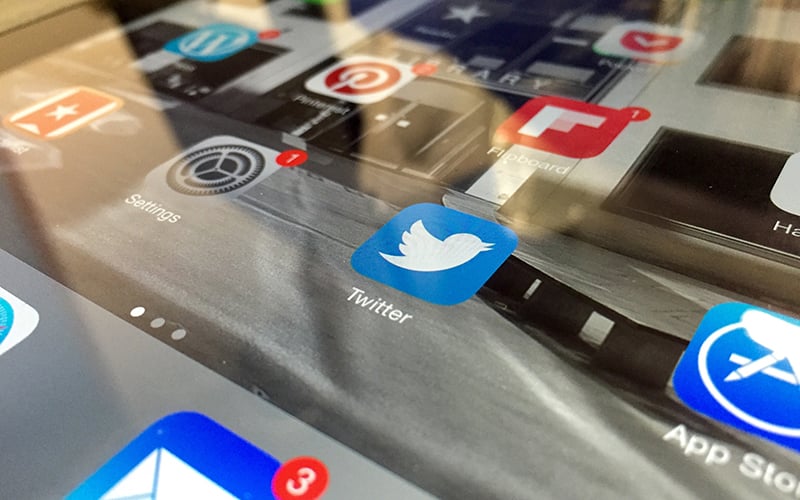
A federal court said President Donald Trump violated the free-speech rights of critics when he blocked them from his Twitter account. But some Arizona lawmakers have briefly blocked users to curb what they said was coarse or threatening language. (Photo by ijclark/Creative Commons)
WASHINGTON – Raghunathan Srinivasan’s online interactions with Rep. Andy Biggs, R-Gilbert, started off innocently enough.
First it was emails expressing concern about efforts to repeal the Affordable Care Act – Srinivasan’s 4-year-old son has a pre-existing medical condition but was able to get insurance through the act, which Biggs vehemently opposed. The responses were polite, if formulaic.
But when Srinivasan began responding publicly to Biggs on the congressman’s Facebook page, the response from others was immediate – and savage. Srinivasan said his posts were often bombarded with ethnic slurs.
“I started getting things like ‘raghead,’ ‘ragman,’ ‘towelhead,'” said Srinivasan, a torrent of insults that so bothered him that he eventually snapped and told another poster to “go die of cancer.”
That comment got him blocked from Biggs’ Facebook page.
“I am not proud of that, I never have been, I should have never said that,” Srinivasan said. “But to be fair I was being called all kinds of names by all kinds of people. Civil discourse is tough on his Facebook page.”
And not just Biggs’ page. Discourse can quickly turn toxic on social media, raising the question of when, if ever, it is appropriate to draw a line.
A federal judge in New York ruled last week that, at least as far as the president of the United States is concerned, the answer is never.
U.S. District Judge Naomi Reice Buchwald said that President Donald Trump violated the free-speech rights of a group of Twitter users who were blocked from his @realDonaldTrump account because of their criticism of him. Buchwald rejected the administration’s position that the president had his own First Amendment right to decide who he associated with.
“The blocking of the individual plaintiffs as a result of the political views they have expressed is impermissible under the First Amendment,” Buchwald wrote. “While we must recognize, and are sensitive to, the President’s personal First Amendment rights, he cannot exercise those rights in a way the infringes on the First Amendment rights of those who have criticized him.”
The opinion is narrowly written and legal experts are split on whether it applies to other public figures operating social media sites. But a lawsuit against an Arizona lawmaker aims to find out.
“We believe the decision regarding President Trump applies to all public officials who open up public forums on social media,” said Darrell Hill, a staff attorney for the American Civil Liberties Union in Arizona.
-Cronkite News video by Pat Poblete
The ACLU sued Rep. Paul Gosar, R-Prescott, after he blocked some people from his social media accounts. The suit was originally filed by J’aime Morgaine, a constituent of Gosar’s who said she was blocked from his official Facebook page after making posts that were critical of him.
Gosar declined to comment on Morgaine, citing the pending ACLU lawsuit. But at the time, he told media outlets that he needed to be able to block users to prevent them from using foul language, threating or intimidating people.
Morgaine, now a candidate for the Arizona House of Representatives, said she tried to address the issue with Gosar’s office, but when she got no response, “I decided to file the lawsuit myself.”
Her September 2017 suit got the attention of national media. A little over a month later, Gosar relented and unblocked her access to his account.
“Welcome back to my Facebook, @JMorgaine,” reads an Oct. 11 tweet from Gosar’s verified Twitter account. “The floor’s all yours.”
But that didn’t stop Morgaine or the ACLU, which subsequently decided to represent her.
In April, the ACLU filed a suit in U.S. District Court in Arizona alleging that Gosar “infringed on (Morgaine’s) right to express opposing viewpoints in online public forums.”
“Our feeling is that the First Amendment prohibits public officials from suppressing speech on the basis of the speaker’s viewpoint,” Hill said.
But other legal experts are split.
The Trump case “certainly doesn’t set nationwide precedent, this is just a lower court ruling,” said Elliot Minceberg, a senior fellow at People for the American Way.
“There are some unique things to the president’s Twitter account that may or may not apply to Rep. Gosar,” Minceberg said.
But Mark Rotenberg, executive director of the Electronic Privacy Information Center, thinks Buchwald’s ruling will apply not just to Gosar and the president but to all “government officials who use social media in an official capacity.”
The White House did not respond when asked if the president has unblocked the seven plaintiffs in the lawsuit against him.
Biggs, like Gosar, eventually restored access for Srinivasan, who currently has full access to Biggs’ page. A spokesman said Biggs no longer prevents anyone from accessing his page.
“We do not block anyone on social media,” Daniel Stefanski said. “It’s our job to respond to our constituents and allow them a public forum to express their opinions.”
Srinivasan said he’s glad to be back. He still regrets the comments that got him banished, but has learned that a debate on social media can sometimes be a rough-and-tumble experience.
“If you post anything on there against their views, they will start attacking you,” he said of his previous experience. “There’s not a chance for communication or a dialogue, their attacks are immediate.”
But being blocked did not stop Srinivasan from expressing his opinions – he just picked up the phone and called his congressman’s office.
“All the time I didn’t post on his Facebook page, I made sure I called his office and I gave them an earful,” he said. “So it was probably more painful for them than for me.”